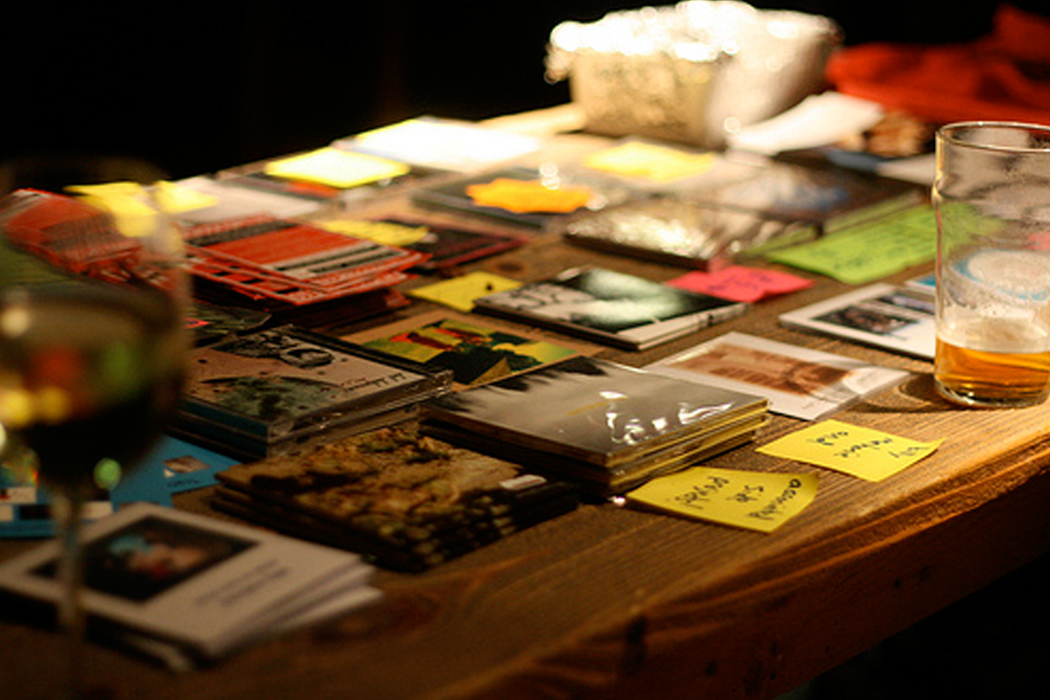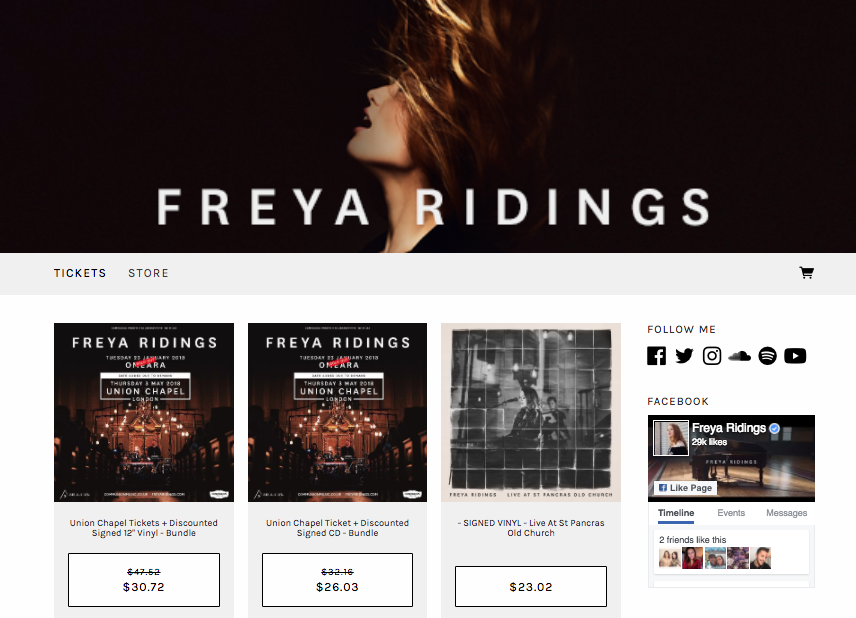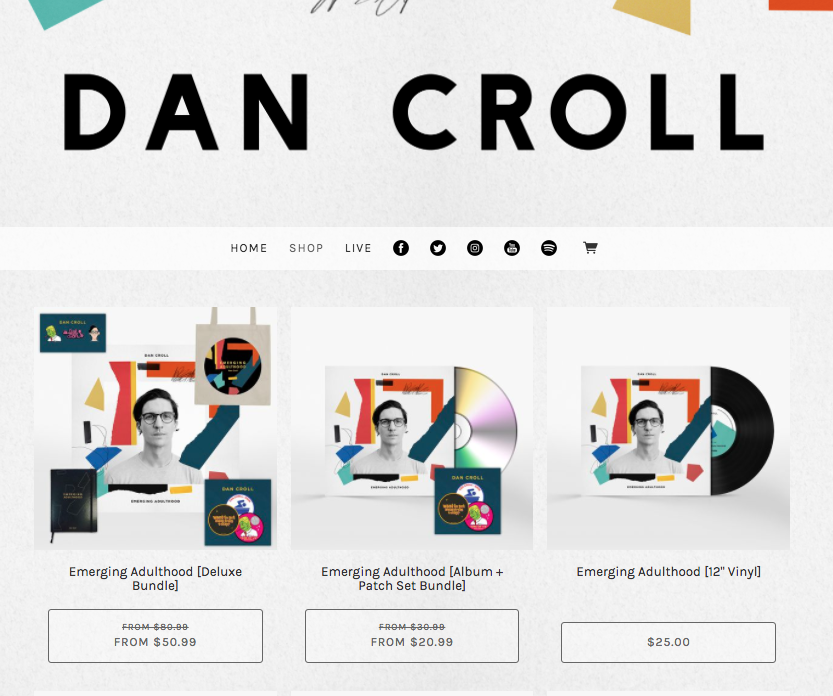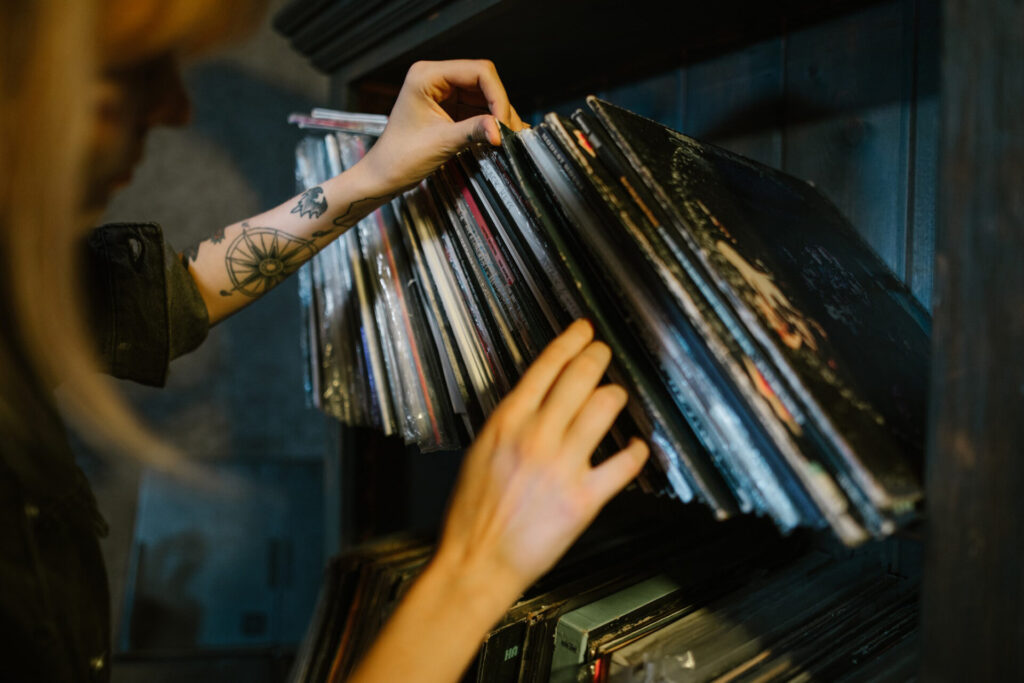
+ Welcome to Soundfly! We help curious musicians meet their goals with creative online courses. Whatever you want to learn, whenever you need to learn it. Subscribe now to start learning on the ’Fly.
If you’ve ever been on the road or toured for an extensive period of time, you know that #merchlife is real. Merch isn’t just an integral part of the live experience and a way for fans to remember the amazing night out — it can serve as a decent revenue stream and a massive branding opportunity. Meaning, the objective should always be to sell as much as possible.
It’s common to create a new batch of merch for different outings or special events, but what happens to the rest of it — those T-shirts, totes, limited-edition posters, and more from past shows? For some artists, old merch might be boxed up and stuck in the garage. Others might trot it out at future concerts and just hope it sells.
If this scenario of overstocked inventory sounds familiar to you, good news — we picked the brain of Gabrielle Nicot-Berenger, Digital Marketing Manager, at Music Glue — a UK-based online platform on which everyone from DIY artists to superstars sells their merch, tickets, experiences, and more — to find out how artists can clear out that old merch, turn a profit, and nurture relationships with fans along the way.
1. Make your online merch store stand out.
As Music Glue empowers artists to sell merch online, Nicot-Berenger suggests sprucing up your store to make it as eye-catching as possible. This goes beyond just making sure your online store is well presented and organized (although, of course, that’s part of it) — make sure it also fits your branding. When fans visit it to browse your products, it has to be consistent with what they’ve come to expect from you as an artist.

Sometimes, this is challenging when you’re trying to sell old merch that doesn’t necessarily fit into your current branding. In those cases, be sure to clearly label those items with “Tour 2013,” “2014 Edition,” or something that denotes that those products are not from your current campaign. If you have a bunch of merch items from these particular runs, it may even make sense to create a dedicated category just for them.
2. Use discount codes and coupons.
With most merch-selling platforms, artists have the option to generate special offers, including promotional codes and discount pricing. While these tactics work quite well around the holidays, there’s no wrong time to pass around a coupon code.

An added bonus of this method is that by creating different codes and posting them to different social media platforms (plus a separate one for your mailing list), you’ll be able to track where fans are finding them and which platform led to the most sales. If codes and coupons seem like too much of a hassle, sales work especially well when clearing out old merch.
“To try and get rid of stock,” says Nicot-Berenger, “a common strategy is to do flash sales for a limited time with fairly significant discount, like 50% off the whole store, for example.”
3. Use buzzwords, and tell a story.
The way you list and advertise your merch is often a huge attention-grabber. To catch fans’ eyes, try including phrases like “limited edition,” “almost gone,” or “last chance,” alongside your older merch so there’s a sense of urgency and scarcity that might just provoke them to hit that buy button.
It’s also important to tell the story of your merch. This doesn’t mean writing an epic saga about the trials and tribulations of the tour it came from, but at least add something about why this piece of merch is meaningful. Was it designed by a loved one? Was it exclusive to a special show? Include anything that might make a fan fall in love and need to have it.
4. Bundle your products.
A great way to give merch new life, in general, is by pairing it with other items as a bundle either online or at your actual, physical merch table. Though there doesn’t have to be a common theme connecting any of the products you pair up, Nicot-Berenger says some artists using Music Glue have themed bundles according to releases or tours (i.e., “UK Tour 2017 Bundle”), which typically include a copy of an album or EP and any promotional merch that went along with that particular release.
Otherwise, bundling a few pieces of old merch with a super-cool new item is a great way to unload older products with something new that will probably sell on its own.

5. Turn old merch into exclusives.
Instantly increase the appeal of older pieces of merchandise by signing them. Fans, in general, love merch that takes it to the next level, and signed pieces are often the highest echelon. Offer to personalize the autograph and throw in another, small token (like pinbacks from your latest tour, for example) with the purchase of a signed item. Even better — mention that your signed items are exclusive to your online merch store to increase demand without hauling old products on the road with you.
6. Hold a contest or giveaway.
If you’re in a storage crunch or have exhausted all other options, there’s one surefire way to rid yourself of your merch overhead: giveaways and contests. A huge perk of this tactic is, obviously, delighting your fans. Who doesn’t love free swag from one of their favorite artists? While monetarily you may not gain much what you gain in brand equity and fan bonding way outweighs simply letting your overstock collect dust.
If you’re dealing with an excess amount of old merch, there’s one piece of good news: technically, merch is never “old,” says Nicot-Berenger. Unless something about the merch (its look, color scheme, or general branding) absolutely doesn’t jive with who you are now, there’s still hope for a sellout. Experiment with discounts and promotions, spruce up your shop and table, and, if all else fails, make your fans happy with a fun contest.
—
 Allison Johnelle Boron is a Los Angeles-based writer and editor. Her work has appeared in Goldmine magazine, Paste, and more. She is the founder of REBEAT, a “blogazine” focused on mid-century music, culture, and lifestyle.
Allison Johnelle Boron is a Los Angeles-based writer and editor. Her work has appeared in Goldmine magazine, Paste, and more. She is the founder of REBEAT, a “blogazine” focused on mid-century music, culture, and lifestyle.




